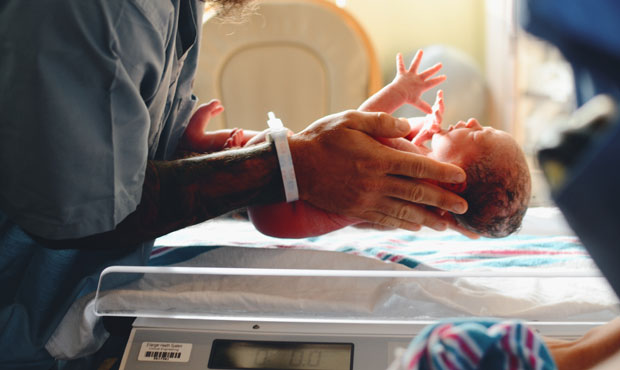Study including 11 PNW hospitals says pregnant women have fewer complications with midwife
Dec 11, 2019, 12:56 PM | Updated: 1:34 pm

A new study paints a positive picture for midwives both in the Northwest and beyond. (Christian Bowen, Unsplash)
(Christian Bowen, Unsplash)
A new study shows that women with low-risk pregnancies who were cared for by a midwife left the hospital with fewer complications and interventions than women who had an obstetrician deliver their baby.
There were 30 percent fewer C-sections for first time moms and fewer women got epidurals. Women who worked with a midwife were less likely to be induced, to have an episiotomy and forceps and vacuums weren’t needed as often.
The data looked at 20,000 women and included 11 Pacific Northwest hospitals, including UW Medicine.
“I’m, like, totally traditional medicine, never done anything out of the mainstream of going to the doctor,” said Snoqualmie’s Erin McEachran. “So at first having a midwife felt really weird to me. Does this person know what they’re doing?”
Given a year to live, Seattle mother writes children’s book about death
McEachran has two sons, a three-year-old and a five-month-old. She went the OB route with her first child, but for insurance reasons she was assigned a midwife at Swedish Hospital.
“I feel like I was pretty snobby and kind of made fun of midwives prior to my experience of having a midwife,” she admits.
There are a lot of misconceptions about midwives: That they only facilitate home births and natural, drug-free births, they don’t have much schooling and can only assist a doctor. But none of that is true.
“Most midwives, they’ve got a nursing degree, an RN, and then a graduate degree in midwifery,” said Mary Lou Kopas, Chief of Midwifery for UW Medicine at Northwest Hospital. “So I went to the University of Washington, I got a masters in midwifery at the school of nursing there.”
When you work with a midwife, there is no OB in the picture unless something goes wrong.
“You’re going to come to the same number of visits during your pregnancy, you’re going to get the same kind of testing and ultrasounds,” said Kopas. “The midwife will admit you to the hospital and you’ll have a labor nurse and access to an epidural in the hospital if you want it. We’ll do your birth and discharge you from the hospital. Midwives also care for newborns so we work a lot with breastfeeding support. That’s a little bit of a difference from obstetricians.”
The study doesn’t reveal why midwives are getting these positive results, but Kopas speculates it’s because midwives spend a lot more time with their patients than OBs do, because their time isn’t as expensive.
“During the birth [the midwife] was there doing a lot more explanation about what she was doing and she was with me a lot more of the time,” McEachran said. “When I had my first child it seemed like the OB literally came in for the last ten minutes, caught him and that was it. Afterwards, I feel like there was a lot more personalized care. [The midwife] came and talked to my husband and I for a really long time, even emotionally, how we were feeling, which was different. When I had the OB, I feel like she just came in and wrote me a prescription for Oxytocin and that was that.”
Kopas says that time and care can calm a woman’s mind, which also puts her body at ease. They prioritize including women in decision making and recognize that no two people and births are alike.
Kids don’t have time to eat school lunch, Washington aims to fix that
“Sometimes they just need somebody who’s there saying, ‘Everything is okay, things are going normally, this is what’s happening.’ Making sure they understand so they feel safe and supported and can relax and do what they need to do,” said McEachran. “At the heart we’re mammals, and when mammals birth they tuck in someplace safe and they go into labor. And if there’s a predator nearby and they don’t feel safe, the labor stops and comes back when it’s a safer time. So we see that when women come to the hospital. Sometimes their contractions slow down and on some level their body is like, ‘OK, different venue, am I OK? Is everything alright?'”
She says midwifery is far more common in other parts of the world.
“One of the things that made this study interesting is that in the United States about 10 percent of babies right now are being born with midwives. In most of the developed world, in the UK, Canada, Australia and Europe, most pregnancies would be managed by midwives. So there is just a cultural difference around birth in the United States.”













